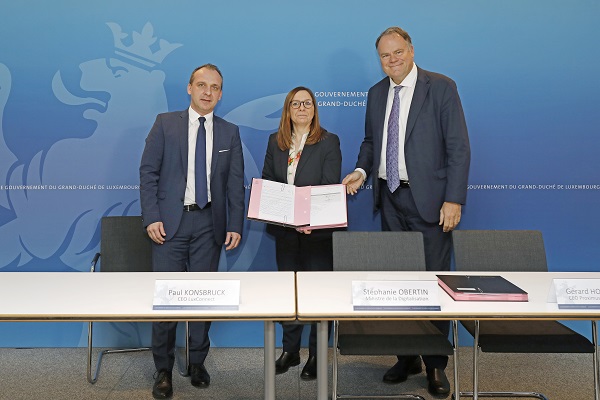 (L-R) Paul Konsbruck, CEO of LuxConnect; Stéphanie Obertin, Luxembourg's Minister for Digitalisation; Gerard Hoffmann, CEO of Proximus Luxembourg;
Credit: MinDigital
(L-R) Paul Konsbruck, CEO of LuxConnect; Stéphanie Obertin, Luxembourg's Minister for Digitalisation; Gerard Hoffmann, CEO of Proximus Luxembourg;
Credit: MinDigital
On Thursday 23 January 2025, Luxembourg's Minister for Digitalisation, Stéphanie Obertin, the CEO of LuxConnect, Paul Konsbruck, and the CEO of Proximus Luxembourg, Gérard Hoffmann, signed a partnership between the government and Clarence SA to implement a sovereign disconnected cloud solution.
Clarence's solution is expected to provide the government, via the Government IT Centre (CTIE), with "high-value-added services in a completely disconnected environment, ensuring the sovereignty of Luxembourg's data".
Minister Obertin welcomed this initiative, saying: "I am delighted with this major step forward in favor of high-quality public services. Today, the Luxembourg State is signing a unique partnership of its kind in Europe, thus relying on a sovereign and disconnected solution for cutting-edge applications. Following the world's first e-embassy, Luxembourg is once again a trailblazer by creating the necessary conditions for data security and its use by administrations to provide public services that benefit citizens and businesses". She added that the partnership with Clarence "closely follows the announcement of the MeluXina-AI and AI Factory projects and embodies the government's commitment to increasingly invest in tools that foster the emergence of a national data ecosystem and strengthen Luxembourg's digital sovereignty."
As explained by Clarence and the CTIE, Clarence collaborates with LuxConnect, a 100% state-owned private company and "a key player" in Tier IV-certified data centre operations, and Proximus Luxembourg, a CSSF-regulated Luxembourgish company with "proven expertise in managing and utilising highly confidential data". The CTIE will directly oversee the technical and operational management of Clarence's infrastructure, which is said to be fully dedicated to the state. This is expected to enable the CTIE to "leverage the most advanced technologies for sensitive data while ensuring full confidentiality, complete control and unwavering sovereignty".
"The disconnected cloud platform, installed in two LuxConnect Tier IV data centres and managed locally, combines strong sovereignty with access to the best cloud capabilities," said Paul Konsbruck. "As a pioneer in Europe, it offers an experience similar to public cloud solutions within a secure environment under Luxembourg jurisdiction. This unique solution not only ensures total data control but also creates value for Luxembourg by reinforcing our digital autonomy."
According to the CTIE and Clarence, this partnership enables the Luxembourg government to provide innovative sovereign cloud services specifically designed to meet the needs of end-users, including government entities, municipalities and national institutions. It reportedly "paves the way" for the development of modern and secure applications tailored to the requirements of the CTIE and its partners. The project is also said to guarantee "a highly secure" processing environment for sharing sensitive data, including public security, defence and unclassified educational and research data.
Moreover, the platform will address specific data legislative requirements, such as the AI Act, by implementing "dedicated, secure and compliant" sandboxes. It will also accommodate future regulations such as the European Health Data Space. The partners added that this project serves as "a strategic lever" to strengthen Luxembourg's digital autonomy while offering users "a powerful tool" for data processing and sharing in a sovereign framework.
Gérard Hoffmann, CEO of Proximus Luxembourg, added: "Being respectful of European data privacy regulations is not just a legal obligation; it is also a demonstration of commitment to transparency, security and user trust, while ensuring a solid foundation for innovation and leveraging the potential of modern digital solutions. Clarence and its sovereign disconnected cloud platform are fully aligned with Luxembourg's commitment to being a pillar of trust, compliance and innovation in the international digital economy."








